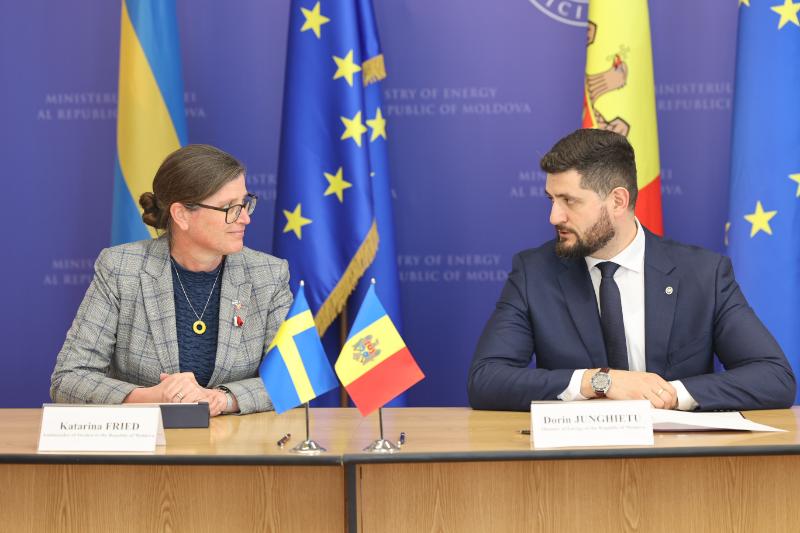
Sweden to provide Moldova with grant worth about 820,000 euros, to facilitate waste-to-energy transformation
Moldova will collaborate with Sweden in developing waste-to-energy transformation projects. An agreement on grant worth 9 million Swedish crowns (about 820,000 euros) today was signed between the Ministry of Energy of Moldova and Swedfund International AB (Sweden's Development Finance Institution).
According to the grant agreement, Swedfund will finance consulting services costs for feasibility studies regarding waste-to-energy facilities in two settlements of the country.
“I express my sincere gratitude to the Kingdom of Sweden for its invaluable support in exploring the potential of waste-to-energy transformation and supporting the energy transition. Thanks to the support provided, we will be able to use the data and information collected through this study, which will later guide us in creating a clear framework for identifying and developing waste-to-energy projects. These projects will not only help efficient waste management, but will also contribute to strengthening the production of renewable energy,” said Energy Minister Dorin Junghietu.
For her part, Ambassador of Sweden to Moldova Katarina Fried emphasized that the initiative would support the country's energy security and facilitate the transition to energy production from renewable sources.
“Today, I am particularly pleased to discuss Swedfund's fourth project in Moldova: Waste-to-Energy (WtE). The main goal of our cooperation is to establish sustainable waste management solutions that transform waste into valuable resources, such as electricity and heat. This not only addresses waste management challenges, but also contributes to enhancing Moldova's energy resilience and environmental sustainability,” said Katarina Fried.
The study will be carried out within 6-12 months. Its purpose is to evaluate the technical, economic and environmental feasibility of implementing waste-to-energy solutions, using the data and information already collected in the study.
Thus, it will provide a clear framework for identifying and developing waste-to-energy (WTE) projects, contributing to efficient waste management and production of renewable energy.
The study will focus on identifying viable technologies, depending on the type of waste and their processing capacity, evaluating the costs and efficiency of each technology in the economic context of Moldova, establishing an energy recovery model, including the type of energy produced (electricity, heat) and potential integration into the national energy network.
Also, it will address the environmental and social impact of implementing a waste-to-energy transformation system, such as: reducing waste deposited in landfills, CO2 emissions, and other pollutants, saving resources and protecting the environment, identifying possible concerns of local communities regarding the implementation of waste processing projects, etc.
Artisan cheeses,solar-powered farms in Cimislia-Basarabeasca livestock cluster of Moldova
Single-use, reusable packaging to be able to be returned against payment in Moldova
Romanian Energy Minister says zero priority for Romania and Moldova Suceava–Balti, Smârdan–Gutinas–Straseni interconnections
EcoVoucher // Nearly 4200 families replaced old appliances with new, energy-efficient ones
As of today new water and sewage tariffs enter into force in Chișinău
Railway of Moldova state enterprise receives first 250 tons of diesel from state reserve
As of 1 April foreign currency payments and transfers between private people to be allowed for real estate sales or purchases
Moldovan apples make first official debut on India's market
Wizz Air launches six new flights from Chișinău to Europe
Moldovan president discusses current challenges and cooperation to support citizens with civil society representatives
Citizens to be able to apply for identity card as of 2 April
GOVERNMENT BUILDS: Rehabilitation works on Bâc river bridge with over 70% completion
Moldovan president hosts group of young participants of the European Model Union Moldova project at Presidency
Bilateral Screening for Chapter 10 – Information Society and Media - finished in Brussels
Moldovan PM participates in launch of National Fund for Innovation
Moldovan president, OSCE High Commissioner discuss social cohesion, multilingual education, protecting local identities
Moldovan head of state participates in Social Synergy National Trade Unions Forum
Governor of Gagauz autonomy placed under arrest for 20 days
Russia economically hits Moldova again, without reason, blocking Moldovan transporters
Moldovan president says people of Moldova only together can build country where each man is respected, backed
Moldovan government says Russia again economically targets Moldova, with no reason given
VIDEO // Pavel Cebanu, Legend of Moldovan football, turns 70
Moldova's Post state enterprise warns against new scam attempt using fake email messages
Queen Marie's personality evoked at an international symposium held at State University of Moldova
Works of rehabilitation of centralized irrigation system start in Stefan Voda district of Moldova


